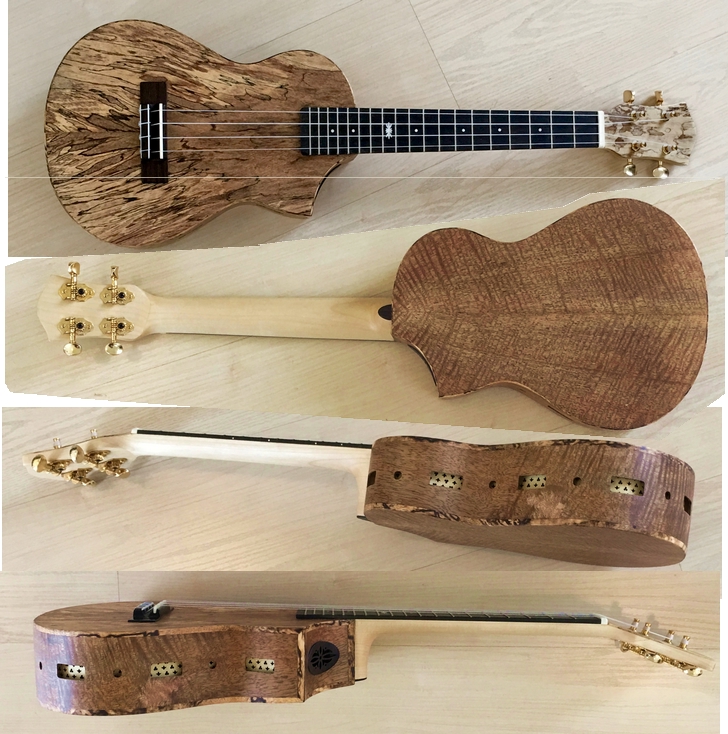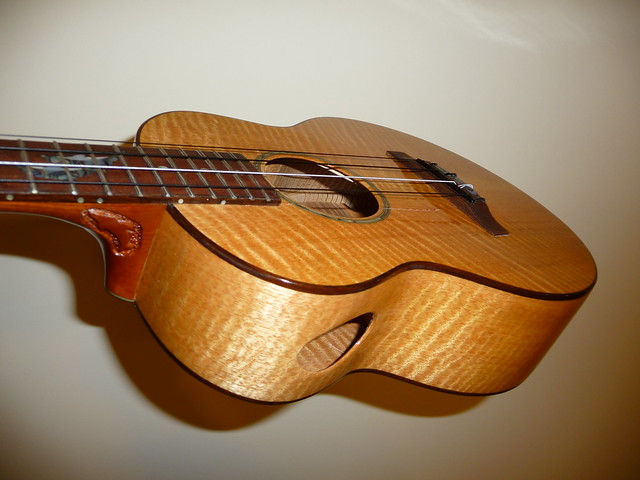You are using an out of date browser. It may not display this or other websites correctly.
You should upgrade or use an alternative browser.
You should upgrade or use an alternative browser.
Who likes mango?
- Thread starter Ukecaster
- Start date
I've never had an instrument made of mango but I adore the looks of that particular wood when it's figured (or flamed in the pics above). For example, the Romero Creations ukes made of mango look brilliant. The issue for me is that the tone just often isn't quite there. Many brands that make mango ukes also make the same models in koa whose tone I much prefer over mango so it's hard for me to justify getting a mango uke.
I had Bruce Wei make me a custom uke of solid spalted mango top, solid flame mango body in a design he originated with sound holes all around the bouts, not on top. It came out great, plays really well and only cost $445 including shipping.

This is Michael Kohan in Los Angeles, Beverly Grove near the Beverly Center
9 tenor cutaway ukes, 4 acoustic bass ukes, 12 solid body bass ukes, 14 mini electric bass guitars (Total: 39)
• Donate to The Ukulele Kids Club, they provide ukuleles to children in hospital music therapy programs. www.theukc.org
• Member The CC Strummers: YouTube: www.youtube.com/user/CCStrummers/video, Facebook: www.facebook.com/TheCCStrummers

This is Michael Kohan in Los Angeles, Beverly Grove near the Beverly Center
9 tenor cutaway ukes, 4 acoustic bass ukes, 12 solid body bass ukes, 14 mini electric bass guitars (Total: 39)
• Donate to The Ukulele Kids Club, they provide ukuleles to children in hospital music therapy programs. www.theukc.org
• Member The CC Strummers: YouTube: www.youtube.com/user/CCStrummers/video, Facebook: www.facebook.com/TheCCStrummers
Last edited:
KanePono
Well-known member
- Joined
- May 28, 2016
- Messages
- 128
- Reaction score
- 58
I really like my Pono Mango Tenor for beauty and tone. Before buying it I tried three models: Mahogany, Mango and Acacia. Just like Goldilocks, the Mango was "just right" for me, even better after Worth Browns were installed. I also own a Pono Acacia Baritone that I kike very much but the wood is not nearly as pretty as the Mango.
About a year ago there was a Pono UL4-15, Steel string, mango baritone for sale here in the "Marketplace". I'm still kicking myself for not jumping on it before some other lucky player got it.



About a year ago there was a Pono UL4-15, Steel string, mango baritone for sale here in the "Marketplace". I'm still kicking myself for not jumping on it before some other lucky player got it.



snowdenn
Well-known member
- Joined
- Aug 16, 2019
- Messages
- 445
- Reaction score
- 47
I've never had an instrument made of mango but I adore the looks of that particular wood when it's figured (or flamed in the pics above). For example, the Romero Creations ukes made of mango look brilliant. The issue for me is that the tone just often isn't quite there. Many brands that make mango ukes also make the same models in koa whose tone I much prefer over mango so it's hard for me to justify getting a mango uke.
I generally like the tone of mango, but at the same time, I prefer loud volume, which mango doesn't always seem to give. Case in point, my Pono mango pineapple has a beautiful tone, but is on the quiet side. Although my experience with Pono is that they aren't particularly loud ukes, so maybe it's the construction.
Similarly, I recently went back and listened to all the HMS sound samples of Romero Replicas on Vimeo, just to hear the differences in their tonewoods. I found them to be mostly similar--it helped that it was the same song and setting/set up for most of them. That was for the koa, spalted mango, spruce/mahogany, and all mahogany. I did find the spruce/acacia and the walnut models to sound the most different, though they're also played in different settings with different songs by a different person.
My experience with mango so far: the tone of the Pono pineapple was better (to my ears) than other Ponos. But like those other Ponos, on the quieter side. I might put that one up for sale. Romero's Replica in mango seems to sound very similar to other Replicas (and have decent volume). For Rebels, their mango has both decent volume and a great tone--in fact, when I was researching Rebels, I found that most people seemed to prefer the mango to their spruce/mahogany, although I think my preference is the other way.
I like my Pono MGT Tenor Mango a lot. It's the base model with a satin finish. I compared the sound with the Deluxe and PC models and thought the satin sounded more open.
The all-mango tenor is definitely warmer and, dare I say, more mellow than the all-Acacia or all-Mahogany models. I have it strung with Worth Browns, which seem to accentuate the warmth.
It certainly isn't a loud tenor. It does have a really pleasant chime to it. Which suits a lot of songs I play.
The all-mango tenor is definitely warmer and, dare I say, more mellow than the all-Acacia or all-Mahogany models. I have it strung with Worth Browns, which seem to accentuate the warmth.
It certainly isn't a loud tenor. It does have a really pleasant chime to it. Which suits a lot of songs I play.
Tomthebaptist
Well-known member
Puglele
Well-known member
- Joined
- Oct 19, 2019
- Messages
- 122
- Reaction score
- 4
I think Mango wood is my favorite so far (haven’t tried koa, only the laminated ones)
I prefer full, warm, not so bright tones. So mango is perfect for me.
My Rebel slimline mango soprano is my favorite at the moment. I fingerpick on it and it sounds like harp
I prefer full, warm, not so bright tones. So mango is perfect for me.
My Rebel slimline mango soprano is my favorite at the moment. I fingerpick on it and it sounds like harp
Peter Frary
Well-known member
When in season locally, I eat mango nearly daily for 5 or 6 weeks. I can't imagine cutting down one of these beautiful trees for a musical instrument when a single tree can feed a dozen families for a month or more.
snowdenn
Well-known member
- Joined
- Aug 16, 2019
- Messages
- 445
- Reaction score
- 47
When in season locally, I eat mango nearly daily for 5 or 6 weeks. I can't imagine cutting down one of these beautiful trees for a musical instrument when a single tree can feed a dozen families for a month or more.
I heard a rumor from a retailer that waiting for wood from fallen mango trees was part of the hold up for KoAloha's mango ukes, since it had been so long since they made them. For a while I really wanted to track one down, but I had no luck and ended up getting a mango Rebel instead. I figured if they're making Opios, they might not be too far off from KoAlohas. I don't know where Rebel is getting their mango from, but I'm very pleased with their product.
Are mango trees scarce/endangered?
KaminTheWeaver
Well-known member
- Joined
- Jul 29, 2018
- Messages
- 220
- Reaction score
- 224
I love my mango Pono. It has a warm yet articulate sound. I can’t bring myself to part from it even though I have “nicer” ukes to play.
johnnysmash
Well-known member
I love the beautiful mango wood. I love the wonderful fruit. I love Mango Trees period and so do the red ants. However, if you want a ukulele with good sound get one of the following woods or a combination of these woods - Acasia, Koa, or Mahogany. My tenor has a solid Acasia top. I tuned it the same as my baritone DGBE because it is easier for an old man to play. Because of sound and playing ability I would not trade it for anything.
Doc_J
Well-known member
I agree, mango wood can make a gorgeous uke. I’m got a Pegasus tenor made from curly mango that is outstanding.
https://forum.ukuleleunderground.com/showthread.php?131378-Pegasus-Curly-Mango-Tenor&highlight=Pegasus+mango
 P1080729 https://www.flickr.com/photos/150516092@N02/, on Flickr
P1080729 https://www.flickr.com/photos/150516092@N02/, on Flickr
https://forum.ukuleleunderground.com/showthread.php?131378-Pegasus-Curly-Mango-Tenor&highlight=Pegasus+mango
 P1080729 https://www.flickr.com/photos/150516092@N02/, on Flickr
P1080729 https://www.flickr.com/photos/150516092@N02/, on Flickr
Last edited:
- Joined
- Jul 16, 2014
- Messages
- 2,014
- Reaction score
- 767
I have the Mainland Tenor Pineapple and regular Concert, both in Mango. They have very good tonal characteristics, volume, and sustain. They sound just a little brighter than my Mainland Red Cedar and Rosewood instruments. I consider Mango to be a desirable tonewood.
I have never handled or played a Mango instrument, so take this with a huge grain of salt. I find the pattern of some spalted Mango instruments to be beautiful, intriguing and wild. I have been less convinced by some of the sound samples I have heard. Of course. I absolutely love the fruit! 

Ukecaster
Well-known member
To me, the mango grain patterns are nore variable than other woods. Sometimes beautiful flame or quilt, but other times with what look like dirty dark smudges.
Similar threads
- Replies
- 21
- Views
- 2K





